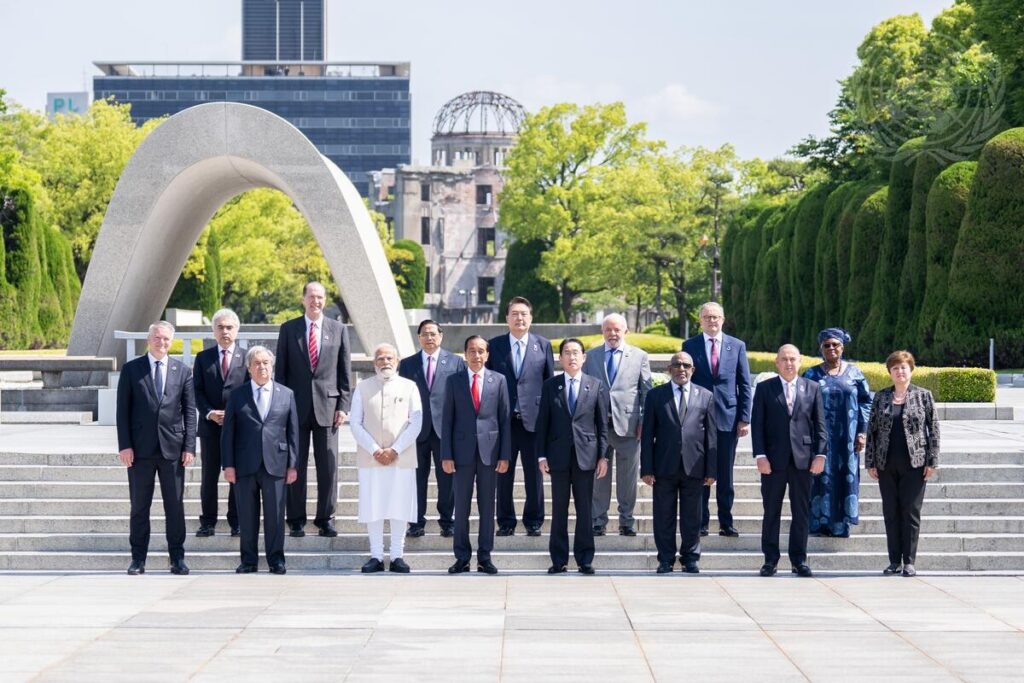Hiroshima/New York, May 21 – In blunt words, U.N. Secretary-General Antonio Guterres told the Group of Seven (G7) countries – considered the world’s richest – that it is morally wrong that the global economic and financial systems have favored them over poor countries.
Guterres, who attended the G7 meeting in Hiroshima, Japan, said his message to the group was “clear” that while the global economy faced uncertainties the majority of countries in the world are suffering through a deep financial crisis. He said the crisis resulted from the crushing economic impact of the COVID-19 pandemic, the climate crisis, Russia’s invasion of Ukraine, unsustainable levels of debt, rising interest rates and inflation.
“Poverty and hunger are rising; development is sinking,” he said, pointing out that problems facing developing countries have three dimensions: moral, power-related, and practical.
“There is a systemic and unjust bias in global economic and financial frameworks in favor of rich countries, which is naturally generating great frustration in the developing world,” he said.
The International Monetary Fund allocated US$650 billion in Special Drawing Rights (SDRs) to countries around the world during the pandemic, he said.
“The G7 countries, with a population of 772 million people, received US$280 billion. The African continent, with 1.3 billion people, received US$34 billion. This was done according to the rules, but from a moral point of view, there is something fundamentally wrong with the rules themselves.”
He pointed out the “extremely unbalanced” recovery from the pandemic between rich and poor countries, with the former printing money and spending their way out of trouble. The later, a total of 52 countries, are in debt distress, near debt distress, or face extremely expensive market financing while Middle Income Countries, many small island developing states, do not qualify for concessional funding and have no access to debt relief.
He said the Bretton Woods Agreement in 1944, which created the IMF and the World Bank, and the creation of the U.N. Security Council, reflected the power relations of 1945, which were dominated by World War II victors.
“The global financial architecture is outdated, dysfunctional and unfair,” he said. “In the face of the economic shocks from the COVID-19 pandemic and the Russian invasion of Ukraine, it has failed to fulfil its core function as a global safety net.
“It’s time to reform both the Security Council and the Bretton Woods institutions. This is essentially a question of redistributing power in line with the realities of today’s world. Even within the present unfair global rules, more can and must be done to support developing economies.”
G7 meeting in Hiroshima
National leaders of the United States, United Kingdom, France, Canada, Germany, Japan and Italy held a three-day summit that ended on May 21, focusing on the ongoing Russia’s war in Ukraine, the global economy as well as conflicts in Africa and food prices.
The European Union took part in the annual meeting. Japan, the host country, invited also leaders of Australia, India, Brazil, South Korea, Vietnam, Indonesia, Comoros (representing the African Union) and the Cook Islands (representing the Pacific Islands Forum).
United Nations correspondent journalists – United Nations correspondent journalists – United Nations correspondent journalists – United Nations journalism articles – United Nations journalism articles – United Nations journalism articles – United Nations News – United Nations News – United Nations News

